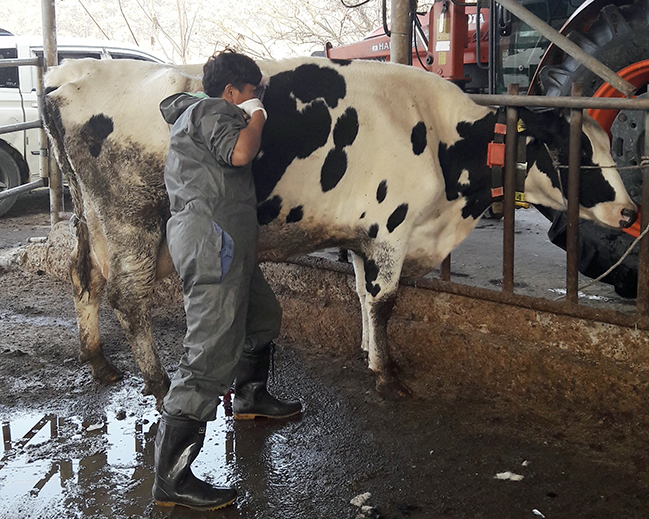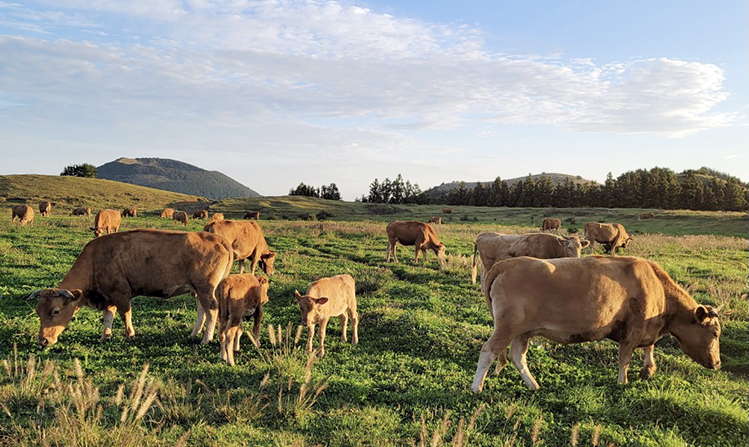A few weeks ago, I saw a news report about pigs in Hwacheon-gun, Gangwon-do that were infected with a disease called “African swine fever (ASF).” Virus-infected livestock spread the disease rapidly as pigs usually live in large numbers in a single stockyard. Today, infectious diseases are threatening not only humans but also animals, which means that taking care of livestock has become more important than ever.
Near Wonju, the city where I’m from, is Hoengseong-gun, a region that is most known for its beef. To learn more about infectious diseases affecting livestock, especially cattle (which are an important source of income and asset for Hoengseong-gun!), and how veterinarians treat them, I decided to interview a livestock DVM (Doctor of Veterinary Medicine), Kyung Hyun Min. Min explained about an infectious virus that targets cows: bovine brucellosis. Bovine brucellosis is a disease caused by Brucella abortus, which leads to miscarriages and premature births in the second half of pregnancy. This can infect animals such as dogs, pigs, goats, sheep, and various wild animals. Min said brucella bacteria are not fatal to cows, but it reduces their productivity and is dangerous because it can be transmitted to humans. This is why special care is needed.

Even though he has been working in this field for over 15 years, he said it is hard to determine the disease or injury of a cow by watching from a distance. “The age, nutritional status, vitality check, specific environment, and observation of the manger are all very important because animals cannot tell someone that they are sick. And a lot of experience is helpful because you have to look at the symptoms and make a comprehensive diagnosis.”Brucellosis spreads through direct contact between cattle. Because cows live in groups, they are infected by licking the lactate secretions of sick cows, or by eating the same food and drinking water in the same space.
The other major reason why brucellosis is hazardous is because it can be transmitted from cattle to humans. Humans can be infected if the milk or dairy product produced from diseased cow is consumed without sterilization. Fortunately, vets continue to check cattle to reduce the danger of brucellosis, and people are rarely infected through milk or other dairy products. The way infection usually occurs is through occupational groups such as ranchers and DVMs, who come into direct contact with cattle.

When asked about how we can apply what veterinarians know about brucellosis, Min said that the coronavirus is a virus that has been in humans and animals for a long time, but it became a global problem because it could mutate easily. Since coronavirus is caused by animals like bats and camels, it is important to pinpoint the source of diseases from wildlife or livestock. Furthermore, we must study the possibility of spreading to humans and find ways to block such viruses. Since viruses tend to mutate in order to survive under extreme conditions, Min thinks it is necessary to approach humans, animals, and natural ecological environment as a single organism.

It is not easy to work near these diseases while knowing the risks. Min said he initially approached these animals with a lot of vigilance, but he is no longer afraid after realizing that brucella and tuberculosis do not have a high fatality rate. If he thoroughly checks his personal hygiene, he can protect himself from almost all possibility of infection.
“Close the barn door after the horse is stolen.” is a Korean proverb which means that it is useless to take action after things have already gone wrong. We are living with numberless viruses. Keeping sanitary rules in daily life is the most fundamental measure to prevent infectious diseases. Through the interview with Dr. Kyung Hyun Min, I learned that it is important to be aware of the risks of infectious diseases and we should prevent them in advance as much as possible.

Haram Yoon
11th grade (Junior)
Holy Trinity Catholic High School (TX)

